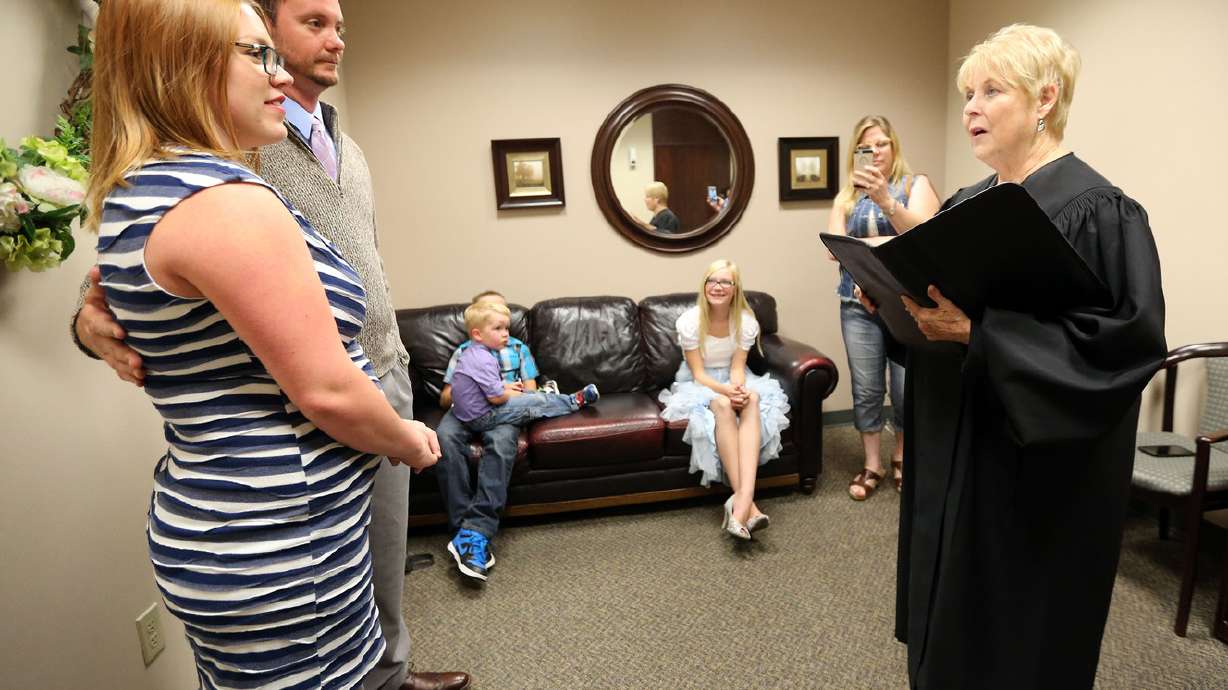Estimated read time: 4-5 minutes
This archived news story is available only for your personal, non-commercial use. Information in the story may be outdated or superseded by additional information. Reading or replaying the story in its archived form does not constitute a republication of the story.
SALT LAKE CITY — A new Utah law requires county clerks to create policies to issue marriage licenses, but it doesn't dictate those guidelines.
The author of the legislation passed earlier this year, however, says he hopes clerks would abide by the spirit of the statute that requires them to have someone available to marry anyone who walks in the door.
"If licensing became an issue, what I hope would happen is that they would have somebody up front to license everyone," said Senate Majority Whip Stuart Adams, R-Layton. "The clerk's office would allow people to step off as long as there was someone to issue the license."
Granting marriage licenses to gay and lesbian couples hasn't caused contention in Utah like it has in Kentucky.
A federal judge found Rowan County Clerk Kim Davis in contempt of court Thursday and ordered her to jail after she refused to issue marriage licenses to same-sex couples. She has said granting marriage licenses to gay and lesbian couples would "violate God's definition of marriage" and infringe on her personal beliefs as an Apostolic Christian.
Davis has resisted suggestions that her deputies could issue marriage licenses because her name appears on the certificates.
Utah law does not require the clerk's name to be on the license, though some such as Salt Lake County Clerk Sherrie Swensen choose to have it on the certificate. Granting licenses, she said, hasn't been an issue.
Some county clerks in Utah initially refused to grant marriage licenses to gay and lesbian couples immediately after U.S. District Judge Robert Shelby overturned the Utah law banning same-sex marriage. But with guidance from their county attorneys, they started granting licenses within days of the ruling.
Since a federal appeals court legalized gay marriage in the state a year ago next month, counties have issued licenses to same-sex couples in accordance with the law.

"I just don't think an elected official should be able to interject personal preferences into their performance of the duties of their office," Swensen said. "I can't even imagine what a mess that might be if all the elected officials did that, not abide by the laws."
State lawmakers approved a bill in March that allows county clerks to opt out of solemnizing same-sex marriages for religious reasons as long as they provide a person inside or outside the office during business hours to perform the ceremony. The statute also protects those who take that option from government retaliation.
"There are many clerk's offices right now that are stepping off in the state of Utah, and nobody even knows about it because it's done so seamlessly because of the legislation we passed last session," Adams said.
Weber and Davis counties are among those that no longer perform marriages but provide couples a list of judges, clergy or others who will conduct weddings. Deputy clerks in Salt Lake County continue to solemnize marriages, performing about 2,000 ceremonies a year.
Utah, Adams said, was ahead of the curve with legislation that provides protections for both religious believers and the LGBT community in housing and employment.
Robin Fretwell Wilson, a University of Illinois law professor, said Kentucky and the nation could take a page from Utah. The country, she said, is now where Utah was last spring: confronting lots of questions precipitated by a federal court ruling requiring it to recognize same-sex marriage.
"Utah faced a choice. It could give protections for people of faith who adhere to a traditional view of marriage — and only them — the kind of one-sided deal that many rightly find offensive," she wrote in a Thursday blog post. "Or, Utah could be fundamentally decent to all Utahns."
Wilson, who helped craft the legislation, said the law for the first time in Utah guarantees access to marriage, using the same process for everyone.
"But the compromise also permitted each office to outsource the solemnization to any willing celebrant in the community, avoiding collisions with people like Mrs. Davis," she wrote.
"Only if Mrs. Davis, as the elected town clerk, could find no other way to fulfill the state's function would her job ever be in jeopardy in Utah. And this is as it should be."









